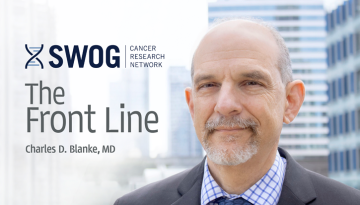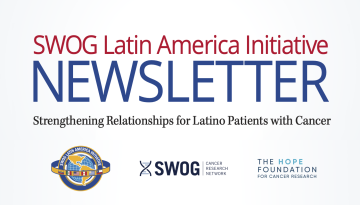Spring Group Meeting: Shorter, But Sweeter
I have exciting news, about a pretty major change to the way we've done business for many, many years.
We have consolidated our group meeting schedule from four days to three, starting in spring of 2025. That meeting will run Thursday to Saturday, May 1st – 3rd, at the Hyatt Regency San Francisco. Registration opens SOON! Look for it on February 25th. Here’s a preview of the schedule (the meeting site will go live closer to registration day).
We think this change will deliver substantial benefits, starting with a significant reduction in costs. We estimate savings of as much as $100,000, just at our San Francisco meeting this spring.
The shorter meeting also means fewer days our members need to be away from their clinic or office. And the new schedule should increase opportunities for members to attend all sessions that interest them. Finally, this three-day approach also aligns SWOG with the practice of most other National Clinical Trials Network groups.
The condensed schedule means we’ll hold a few business meetings (such as The Hope Foundation’s board of directors session) late afternoon or early evening on Wednesday. But group meeting will open in earnest Thursday morning, May 1st, and its final session will end Saturday at 2:30 pm PT.
We’ve worked hard, and I do mean hard, to develop a schedule we think will be more efficient and more effective.
To start, a few sessions that didn’t have to be held at group meeting have been moved to virtual-only slots outside the main group meeting days.
We’ve also shortened several research support committee sessions from two hours to 90 minutes, and we have moved to a single plenary session, which will always include translational medicine (and probably two amusing stories).
In several cases, we’ve consolidated two meetings into a single, longer session. The Lung-MAP trial, for example, will now hold its Site Coordinators Committee and administrative meetings in a joint session.
For committees that have in the past had multiple working group sessions – or separate working group and translational medicine sessions – we’ve combined those multiple sessions into one.
A priority in configuring this schedule has been to make it easier for members to come to the meeting and fully participate.
One example: most of our research committees hold both a working group session and a general session; in most cases, we’ve now been able to schedule both of those sessions on the same day. This should not only help cut the amount of time members must be away from home, it should also, we hope, increase attendance at both meetings.
To encourage wider cross-committee participation, we’ve tried to clarify some of our vocabulary as well. For example, meetings that might previously have been tagged “closed” will now be labeled a bit more descriptively. “Closed” was exclusive rather than inclusive and could seem particularly unfriendly to new members. Instead, we want to lower barriers for members who want to participate more widely.
Here are some of the labels you’ll see next to session names on the spring schedule:
- “committee members only”
This is fairly self-explanatory. And if you’re not a committee member but maybe are looking to collaborate across disease areas and would like to attend? Email our team at meetings@swog.org and let them know why. They can reach out to the committee’s leadership to try to make it happen. (If you’re interested in joining a committee or working group, check out the details on what membership entails and how to apply in our membership policy).
- “working group members only”
Committee working group sessions were meant to be a more confidential venue for discussing proprietary information about trials in development. Interested in attending or joining a working group? See just above.
- “closed business meeting”
We have just a few of these on the schedule, and they’re usually administratively focused. These meetings wear the “closed” label truthfully – they’re taking care of business.
- “invitation only”
Rarely, a session is exclusive. For example, the “Mentoring APPs” session on Saturday is for the six advanced practice providers (APPs) accepted to the new MAPP mentoring program (sponsored, of course, by Hope). No invitation, no admittance.
As in the past, some sessions will require travel to San Francisco – our Clinical Trials Training Course Practicum, for example, is in person only. We’ve labeled most sessions in the schedule to make it clear up front which are in-person and which are hybrid, offering an online attendance option.
Trying to reshape a group meeting’s worth of content has been a real challenge, tackled primarily by Dr. Dawn Hershman and Courtney Wille. They’ve crafted at least 10 iterations of the schedule, continually gathering input and repeatedly refining, to arrive at the current, we hope optimized, version. As Dr. Hershman has said, such scheduling is like working a Rubik’s cube, and she and Courtney have my profound gratitude for lining up the colors on this one.
We realize some members may need to leave one meeting early to get to another, but we have worked hard to reduce instances of this. Overlap is inevitable, but we’ve tried to avoid particularly contentious overlaps (e.g., no overlapping gastrointestinal and surgery sessions).
I’m still a real believer in the benefits of holding a meeting in person – the benefits of engagement and the face-to-face contact that fuels collaboration and is so essential to mentoring. Don’t look to that to change, barring some unpredictable crisis.
We’ve tried to highlight and maximize opportunities for such interaction and to encourage broad participation in redoing the group meeting schedule. I can’t wait to try it out in May. I hope to see you in San Francisco!
Remember: spring meeting registration will open February 25th. Watch swog.org and your inbox.
Other Recent Stories



